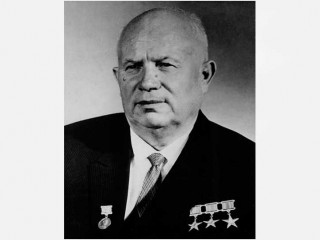
Khrushchev Nikita biography
Date of birth : 1894-04-17
Date of death : 1971-09-11
Birthplace : Kalinovka, Russia
Nationality : Russian
Category : Politics
Last modified : 2010-05-25
Credited as : Communist leader, First secretary of Communist party, Leonid Brezhnev
Khrushchev was born in the Russian village of Kalinovka in 1894, close to the present-day border between Russia and Ukraine. He was employed as a metalworker in his youth, and during the Russian Civil War was a political commissar. With the help of Lazar Kaganovich, he worked his way up the Soviet hierarchy. He supported Stalin's purges, and approved thousands of arrests. In 1939, Stalin sent him to govern Ukraine, and he continued the purges there. During what was known in the Soviet Union as the "Great Patriotic War" (World War II), Khrushchev was again a commissar, serving as an intermediary between Stalin and his generals. Khrushchev was present at the bloody defense of Stalingrad, a fact he took great pride in throughout his life. After the war, he returned to Ukraine before being recalled to Moscow as one of Stalin's close advisers.
Starting his political career while Stalin was still in power, Nikita Sergeyevich Khrushchev would rise to power to eventually carry through a plan for the de-Stalinization of Russia. In his efforts, the arts and public liberty would flourish, but his economic reforms weren’t as realized as he would have liked before he was forced to step down as Russia’s leader.
Born in Kalinovka in Russia in the mid 1890s, he was the son of a miner working in Yuzovka. At the age of 15, Nikita began working with his hands and learning the skills necessary to become a mechanic – skills that would help him later construct Russia’s subway system. This also instilled in him a set of values that would allow him to empathize with the working class people in his country. At the age of 16, he began working as a machine repairman in the same coal mines as his father.
Political ambition took Khrushchev when he joined the Communist party around 1918. During his three years of service, he went back home to manage the coal mine he once labored, but soon was given the chance to go to an industrial institute that would give him the freedom to begin working with a Communist committee near his hometown. Following this service, he went to another Industrial Academy in Moscow where he would be trained for administrative duties, and where he decided to instead join another committee in Moscow that would later have him as their head of party.
Nikita Khrushchev was given the leadership under Stalin of the Ukrainian Communist party and made a part of the Politburo, which meant that he was in essence the chief executive to the Ukraine. He ruled there for a few years until 1949, where he advanced to the rank of lieutenant general, making him undoubtedly the country’s head ruler. By 1950, Khrushchev was made the Communist party’s Secretariat, which meant that he was left with much power at Stalin’s death in 1953. Soon after, he became the party’s chief official soon after he decided to make some controversial political allies.
By the mid 1950s, the world couldn’t deny Russia’s new leader, especially by 1958 when he became the chairman of the mighty Council of Ministers. This made him the new, uncontested head of the Communist party. Surprising some in his new position, he decided to start massive campaigns known as de-Stalinization, which would end Stalin’s worst parts of governmental practices. During this time, Nikita Khrushchev brought a new light to how the outside world viewed Russia. Due to some economic blunders, he was removed from office, but his time in power was seen by the world community as a step in the right direction to bring greater freedom to the people of Russia.
















